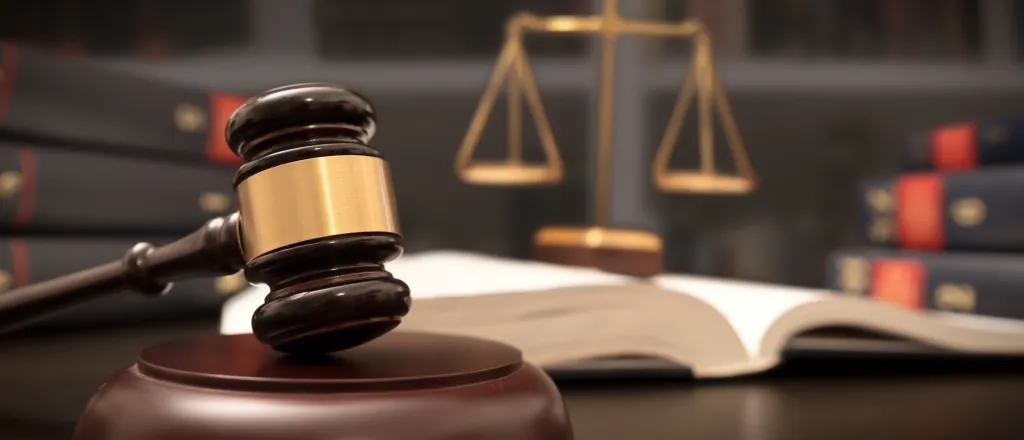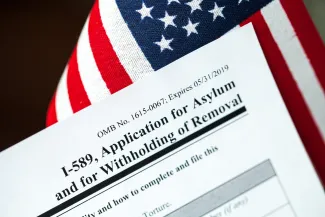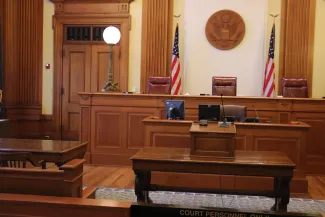
Appeals court rejects Trump argument, maintains Colorado block on ‘alien enemy’ deportations
A trio of federal appellate judges on Tuesday left in place a lower court’s ruling temporarily blocking the removal of detainees held in Colorado under the Alien Enemies Act.
The two-page order from the U.S. Court of Appeals for the 10th Circuit denied an emergency motion for a stay filed by President Donald Trump’s administration last week. Trump has invoked the centuries-old Alien Enemies Act for just the fourth time in U.S. history in an attempt to expedite the removals of hundreds of people the administration claims are part of an “invasion” of the United States by the Venezuelan gang Tren de Aragua.
Citing the authority granted to it by the 1798 law, the administration sent 137 detainees to a brutal maximum-security prison in El Salvador before multiple federal courts, including one in Colorado, ordered a halt to such removals over due process concerns. U.S. District Court Judge Charlotte Sweeney’s temporary restraining order against the removal of any detainees from Colorado under the AEA is set to remain in effect until at least May 6.

Trump’s Department of Justice appealed Sweeney’s ruling to the 10th Circuit last week, asking the court to suspend the TRO pending appeal and arguing that it causes “irreparable harm” by “interfer(ing) with the President’s core authority to protect the nation.”
A panel of three appellate judges — Judges Harris L. Hartz, Gregory Alan Phillips and Joel M. Carson — bluntly dismissed that argument in Tuesday’s order denying the DOJ’s motion.
“Given the important unresolved issues under the Alien Enemies Act and the ruling of the United States Supreme Court that no one in that proceeding be removed under the AEA until further order of that Court … there is no realistic possibility that the government could remove any member of the class from this country before final expiration of the TRO on May 6, 2025,” the judges wrote. “Accordingly, the emergency motion for a stay is denied.”
The case, D.B.U. v. Trump, originated earlier this month as a petition for habeas corpus and proposed class action by lawyers for the American Civil Liberties Union on behalf of two Venezuelan nationals held at the Immigration and Customs Enforcement detention center in Aurora. The plaintiffs, who are identified by their initials, D.B.U. and R.M.M., say they have been falsely identified as Tren de Aragua members by the Trump administration and fear imminent deportation to the CECOT facility, criticized by human rights groups for its crowded and abusive conditions.
About 90% of the deportees sent to CECOT last month had no criminal record, according to Bloomberg. At least one, Kilmar Armando Abrego Garcia, was removed as a result of an “administrative error,” while advocates, attorneys and family members for other deportees say that they were falsely identified as TdA members because of tattoos honoring family members or their favorite soccer team. Trump has openly floated plans to send American citizens to CECOT next.

Sweeney’s order required the Trump administration to provide at least 21 days’ notice, written in a language the individual understands, to any detainee designated for removal under the AEA. It also provisionally certified the class that the two plaintiffs seek to represent, blocking the removal of “all noncitizens in custody in the District of Colorado who were, are, or will be subject to” Trump’s March 14 proclamation invoking the Alien Enemies Act. ACLU attorneys estimate that could apply to more than 100 detainees held at the Aurora detention center.
In U.S. District Court proceedings in the case, the DOJ argued in a Monday filing that Sweeney should decline to certify the case as a class action, claiming again that D.B.U. and R.M.M. are not targeted for AEA removals and haven’t shown they “are members of the class they seek to represent.”
But the ACLU has filed a motion for a preliminary injunction that would extend and clarify the terms of Sweeney’s TRO for the plaintiffs and all members of the proposed class.
“Without an injunction, the government will be free to send hundreds more individuals, including Petitioners and class members, to the notorious Salvadoran prison where they may be held incommunicado for the rest of their lives,” ACLU attorneys wrote in an April 25 filing. “The harm is only magnified by the government’s position that mistakes cannot be remedied, and once an individual is in a foreign prison, they are stuck there.”

















